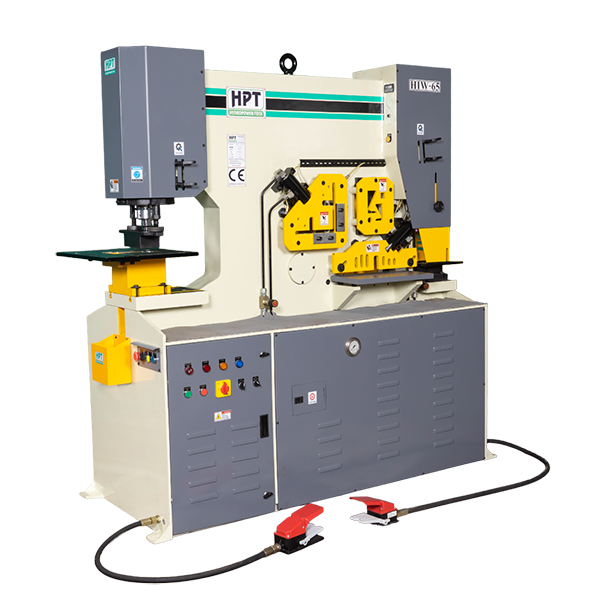The world of metalworking has evolved dramatically, especially when it comes to fabrication machines. Among the most notable innovations is the hydraulic ironworker machine. From its origins as a manually operated device to today’s highly efficient CNC ironworker machine, the journey showcases how the metalworking industry has adapted to changing production needs.
This blog dives into the fascinating evolution of ironworker machines, the rise of CNC fabrication, and how businesses are boosting their output through automated ironworker machines. If you’re working with any type of metalworking equipment, these insights can help you make smarter, future-ready decisions.
From Manual Ironworker Machines to Hydraulic Systems
Before digital advancements, fabrication shops relied on manual ironworker machines. Operators used physical strength to carry out essential processes like shearing, punching, and notching metal plates.
Challenges with Manual Ironworker Machines:
- Labor-intensive and tiring to operate
- Slow productivity
- Inconsistent quality due to human error
- Limited to low-volume production
The emergence of hydraulic ironworker machines transformed these limitations. Using hydraulic pressure instead of manual force, these machines significantly boosted both efficiency and accuracy in metalworking operations.
Why Hydraulic Ironworker Machines Became Essential:
- Multi-station support for various tasks
- Faster and smoother operation
- Safer and less fatiguing for operators
- Excellent for growing fabrication businesses
Modern fabrication machines with hydraulic systems have become the go-to choice for professionals needing versatility, consistency, and safety. They brought a revolution in how fabrication shops approached daily workflows.
The Rise of CNC Ironworker Machines
As demand for speed and accuracy intensified, CNC technology began reshaping the landscape. A CNC ironworker machine combines the strength of hydraulics with the precision of programmable automation.
Key Benefits of CNC Ironworker Machines:
- Perfect design replication using pre-set programs
- Integration with CAD/CAM software
- Lower material waste and improved consistency
- Faster completion of bulk orders
The use of CNC fabrication has enabled businesses to scale their operations efficiently. CNC systems not only automate repetitive tasks but also bring unmatched accuracy to every cut, hole, and notch. For companies working in structural metal, automotive, or construction components, this shift meant reduced errors and better resource utilization.
As The Fabricator highlights, CNC ironworker machines represent one of the biggest productivity leaps for fabrication shops.
Enter the Age of Automated Ironworker Machines
Today, we’re witnessing the emergence of fully automated ironworker machines that fuse hydraulic systems, CNC controls, and smart features into one intelligent solution. These modern marvels are revolutionizing metalworking operations across the globe.
Features of Automated Ironworker Machines:
- Digital touchscreen interfaces for quick setup
- Auto-feed systems that minimize downtime
- Real-time diagnostics and maintenance alerts
- Remote monitoring through IoT-based tech
This new generation of metalworking equipment allows teams to focus more on design and quality while leaving routine tasks to automation. It not only boosts efficiency but also significantly lowers the risk of human errors.
When it comes to ironworker automation, businesses are now choosing smart solutions to meet higher production demands and tighter deadlines.
Why Evolution Matters for Fabrication Shops
Whether you’re operating a small shop or a full-fledged manufacturing unit, upgrading your metal fabrication machines impacts both quality and bottom-line results.
Why You Should Consider Upgrading:
- Lower long-term operational costs
- Scalable output without increasing workforce
- Superior cut and punch accuracy
- Fewer material errors and reduced rework
Need a refresher on the basics? Check out our guide on what a hydraulic ironworker is for beginner-friendly insights.
Automation isn’t just about speed—it’s about staying relevant in a highly competitive industry. As customer expectations shift towards faster turnarounds, only shops with updated CNC fabrication setups will thrive.
Practical Applications of Modern Ironworker Machines
Ironworker machines today are used in a wide range of fabrication scenarios. They’re central to industries where precision, speed, and repeatability are critical.
Common Industries Using Ironworker Machines:
- Heavy structural steel and I-beam production
- Construction component manufacturing
- Industrial equipment and enclosures
- Auto parts and metal bracket production
By incorporating smart features, automated ironworker machines help maintain uniformity, ensure worker safety, and reduce downtime.
Want to explore more? Discover our range of fabrication machines that can revolutionize your output.
Choosing the Right Machine for Your Workshop
Not every fabrication shop has the same needs. Selecting the right ironworker machine requires assessing multiple factors, including current workload, future expansion, and budget.
Quick Checklist:
- How much metal do you process daily?
- Do you require multi-tasking from a single machine?
- Is CNC automation essential for your operations?
- What’s your energy and maintenance budget?
Upgrading from a manual to a hydraulic or CNC model can deliver immediate ROI in terms of time savings and quality improvements.
If ironworker automation aligns with your business vision, now is the time to act.
Conclusion
The transformation of ironworker machines from basic manual devices to smart, automated fabrication machines is a clear reflection of how metalworking continues to advance. Today’s CNC ironworker machine and automated ironworker machines offer more than just convenience—they provide the precision, scalability, and cost-efficiency needed to compete in modern industries.
As more businesses shift toward CNC fabrication and automation, those sticking to outdated equipment may struggle to keep up. Don’t let that be your story.
Ready to scale your metalworking operations? Contact HPT today and find out how the right machine can drive your productivity.

